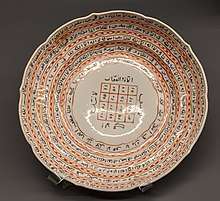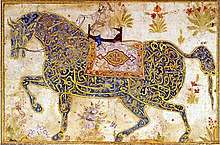Al-Baqara 255
The Throne Verse (Arabic: آيَة الْكُرْسِي, ʾāyat al-kursī) is the 255th verse of the 2nd surah of the Quran, Al-Baqarah. The verse speaks about how nothing and nobody is regarded to be comparable to Allah.[1]

This is one of the best-known verses of the Quran and is widely memorised and displayed in the Islamic world. [2] It is often recited to ward off evil spirits.[3]
Text and translation
| Arabic | Transliteration | English translation[4] |
|---|---|---|
بسم الله الرحمن الرحيم اللَّهُ لاَ إِلَهَ إِلاَّ هُوَ الْحَيُّ الْقَيُّومُ لاَ تَأْخُذُهُ سِنَةٌ وَلاَ نَوْمٌ لَهُ مَا فِي السَّمَاوَاتِ وَمَا فِي الأَرْضِ مَنْ ذَا الَّذِي يَشْفَعُ عِنْدَهُ إِلاَّ بِإِذْنِهِ يَعْلَمُ مَا بَيْنَ أَيْدِيهِمْ وَمَا خَلْفَهُمْ وَلاَ يُحِيطُونَ بِشَيْءٍ مِنْ عِلْمِهِ إِلاَّ بِمَا شَاءَ وَسِعَ كُرْسِيُّهُ السَّمَوٰتِ وَالأَرْضَ وَلاَ يَئُودُهُ حِفْظُهُمَا وَهُوَ الْعَلِيُّ الْعَظِيمُ |
Allāhu lā ʾilāha ʾillā huwa l-ḥayyu l-qayyūmu |
Allah! There is no deity but Him, the Alive, the Eternal. |
Ayatul kursi Benefits and Hadith

- Abu Umamah Radiyallahu 'anhu narrates that Rasulullah Sallallahu 'alaihi wasallam said: He who recites Ayatul Kursi after every obligatory Salat, nothing but death restrains him from entering Paradise. In another narration: “Qul hu wallahu Ahad” is to be recited after Ayatul Kursi.
(Book: Muntakhab Ahadith, English Hadith 31)[5]
- Hasan ibne-'AlT Radiyallahu 'anhuma narrates that Rasulullah Sallallahu 'alaihi wasallam said: He who recites Ayatul Kursi after obligatory Salat, is in the protection of Allah till the next Salat.
(Tabarani) (Book: Muntakhab Ahadith, English Hadith 32)[6]
- Ubayy ibne-Ka'b Radiyallahu 'anhu narrates that Rasulullah Sallallahu 'alaihi wasallam asked: O Abu Mundhir! Do you know which verse from the Book of Allah is the greatest?
I replied: “Allah and His Messenger know best!” Rasulullah Sallallahu 'alaihi
wasallam asked: “O Abu Mundhir. Do you know which verse from the Book of Allah is the greatest?”
I said: “Ayatul kursi”
He then struck my chest and said: “Congratulation to you for this knowledge, Abu Mundhir!”
(Book: Muntakhab Ahadith, English Hadith 35)[7]
- Abu Hurairah Radiyallahu 'anhu narrates that Rasulullah Sallallahu 'alaihi wasallam said: For everything there is a crest, and indeed the crest of the Qur'an is Surah Al-Baqarah. And in it there is a verse, which is the chief of all the verses in the Qur'an, and that is Ayatul kursi. (Tirmidhi)[8]
- Ma'qil ibne-Yasar Radiyallahu 'anhu narrates that Rasulullah Sallallahu 'alaihi wasallam said: The crest, and apex of Qur'an is Surah Al-Baqarah. With every verse of it, eighty angels descend. The Ayatul kursi has been revealed from beneath the Divine Throne, then it was integrated into Surah Al-Baqarah. Surah Yasin is the heart of the Qur'an. Whoever recites it, to please Allah and for the Hereafter, but he is pardoned. So recite this near your dying people.
(Book: Muntakhab Ahadith, English Hadith 51)[9]
Because the Throne Verse is believed to grant spiritual or physical protection, it is often recited by Muslims before setting out on a journey and before going to sleep.[2]
Ayat al-Kursi is regarded as one of the most powerful ayahs in the Quran because when it is recited, the greatness of God is believed to be confirmed. The person who recites this ayah morning and evening will be under protection of Allah [10] from the evil of the jinns; this is also known as the daily adkhar.
It is used in exorcism, to cure and protect from jinns. [11]
Symmetry of Verses
Ayat al-Kursi displays an internal symmetry comprising concentric looping verses surrounding a pivotal chiasm 'x' of the type A B C D X D' C' B' A'. The reciter imagines him or herself walking through Ayat al-Kursi until reaching the centre, seeing what is in front and what is behind, and finds they represent a perfect reflection of each other. [12] The central chiasm is represented by "yaʿlamu mā bayna ʾaydīhim wa-mā ḫalfahum meaning "He knows what is before them and what is behind them". This is flanked symmetrically outwards so that A corresponds to A', B corresponds to B', and so forth. For example, line 3 "he is the lord of the heavens and the earth" corresponds to line 7 "his throne extends over heavens and earth".
See also
References
- Abdullah Yusuf Ali (1983) [First published 1934]. The Holy Qur'ān: Text, Translation and Commentary. Brentwood, Maryland: Amana Corp. pp. 102–103.
- Seyyed Hossein Nasr, ed. (2018). The Study Quran. HarperCollins Publishers. p. 110.
- Afzal, Sagheer. (2011). The Reluctant Mullah. London: Halban. ISBN 978-1-905559-27-5. OCLC 782868200.
- Quran 2:255 (Translated by Pickthall)
- "Ayatul Kursi(ayat al kursi) English Meaning,Benefits,Hadith - muslimgoogle". www.muslimgoogle.com. Retrieved 29 April 2020.
- "Ayatul Kursi(ayat al kursi) English Meaning,Benefits,Hadith - muslimgoogle". www.muslimgoogle.com. Retrieved 29 April 2020.
- "Ayatul Kursi(ayat al kursi) English Meaning,Benefits,Hadith - muslimgoogle". www.muslimgoogle.com. Retrieved 29 April 2020.
- "Ayatul Kursi(ayat al kursi) English Meaning,Benefits,Hadith - muslimgoogle". www.muslimgoogle.com. Retrieved 29 April 2020.
- "Ayatul Kursi(ayat al kursi) English Meaning,Benefits,Hadith - muslimgoogle". www.muslimgoogle.com. Retrieved 29 April 2020.
- Bajirova, Mira (14 December 2018). Infertility Caused by Decreased Oxygen Utilization and Jinn (Demon). Partridge Publishing Singapore. ISBN 1543749089.
- "Quran Tafsir Ibn Kathir - the Virtue of Ayat Al-Kursi".
- http://quranic-musings.blogspot.com/2014/10/chiastic-structuring-in-ayat-al-kursi.html. Missing or empty
|title=(help)